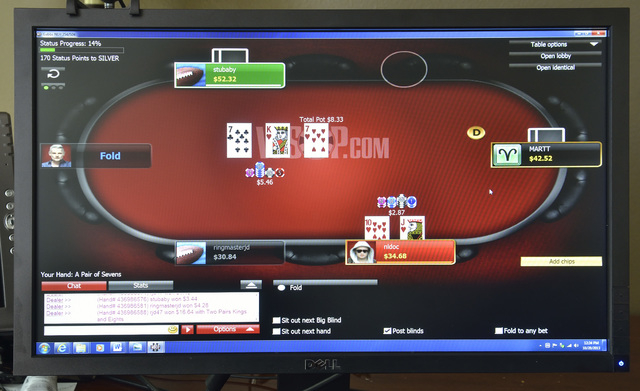Inside Gaming: Lots of raving, but little revenue

Lost in the heated rhetoric over the expansion of Internet gaming is a harsh reality.
Legal online wagering has not been the financial windfall many analysts predicted.
Initial returns from the three states that enacted Internet gambling laws are not overflowing the balance sheet.
New Jersey’s online revenue is a letdown. Delaware’s figures are inconsequential.
Nevada won’t break out online poker revenue on a monthly basis until at least three websites accept bets. The third site was unveiled last week, meaning February’s statewide gaming revenue totals — which won’t be known until late March — will provide a small window into the extent of the activity here.
Internet gaming proponents argue that it’s early in the game.
The legal and regulated domestic market hasn’t even celebrated its first anniversary. Nevada’s initial website is just 10 months old. Delaware launched on Halloween; New Jersey went live shortly after Thanksgiving.
Factors beyond the usual startup issues kept many gamblers offline.
The major challenge is that in all three markets, the wagering must take place on computers or mobile devices within that particular state’s borders.
Nevada is a mostly rural state with a population base that barely supports two poker-only websites, let alone a third.
New Jersey has 9 million residents and is adjacent to East Coast population centers, including New York City and Philadelphia. State gaming regulators have registered almost 200,000 online player accounts in the Garden State since the end of November.
However, payment processing issues involving banks unwilling to accept online gaming-associated credit card transactions have kept many players away from the virtual tables. Also, geolocation errors blocked some New Jersey customers after they were mistakenly perceived as being in another state.
“Online gaming is still in its infancy, Union Gaming Group analyst Robert Shore said. “So we don’t want to extrapolate too much from initial data points.”
New Jersey reported $9.5 million in Internet gaming revenue for January. The figure was a 28 percent increase over December’s numbers, but far below the $12 million to $15 million per month predicted by most analysts.
Eilers Research gaming analyst Adam Krejcik said geolocation and payment processing errors factored in January’s revenue figures, although the effect was less than in December.
“That said, we would still categorize this month’s data as a slight disappointment,” Krejcik said.
Most analysts believe the New Jersey online market will heat up. The websites offer a full slate of casino games, and players from major cities can be reached through promotions and advertising.
“Several factors will drive sequential growth,” Fitch Rating Service analyst Alex Bumazhny said in a report on the New Jersey market. “The primary driver will be the ramp-up in players’ awareness of online gaming as a result of operators’ marketing efforts. Online operators’ executives have been open about the importance of marketing aggressively early on.”
One analyst noted an increase in print and billboard advertisements for several casinos’ online poker activities. Also, January’s announcement that NBA’s Philadelphia 76ers and the NHL’s New Jersey Devils had struck a marketing deal with Bwin.party, Boyd Gaming Corp.’s online gaming partner, spurred some interest.
For now, New Jersey is dominated by two companies: Boyd Gaming, through its partnership with European Internet gaming in the Borgata online gaming presence, and Caesars Interactive Entertainment, which operates a website based on the World Series of Poker in partnership with Gibraltar-based 888 Holdings.
Together, the companies accounted for 73 percent of the market. Station Casinos subsidiary Ultimate Gaming runs the online site for the Trump Taj Mahal and was a distant third in January with 9 percent of the New Jersey total.
Boyd hopes to grab a larger share through mobile gaming applications for smartphones and tablet computers. Caesars, which also operates WSOP.com in Nevada, offers online players opportunities to win seats at live-play World Series of Poker events at the Rio this summer.
Agreements between states to share customers, gaming revenue and taxes would be the easiest way to grow the online gaming market nationally. But more than three states need to be part of the mix.
In January, GamblingCompliance.com released a study showing California, Colorado, Louisiana, Mississippi and Pennsylvania and five other states were considering Internet wagering legislation this year.
Whether lawmakers will follow through is anyone’s guess.
Nevada’s online poker market — estimated at $200,000 to $500,000 in revenue per month — is still a giant question mark. Without multistate agreements, additional websites are carving up smaller slices of the pie.
UltimatePoker.com became the state’s first legal website last April. WSOP.com was launched last September. Last week, RealGaming.com, owned by the South Point, went live.
Boyd and MGM Resorts International, despite earning interactive gaming approval from Nevada regulators almost two years ago, have stayed away, primarily because partner Bwin.party has yet to be licensed by the state.
Real Gaming marketing executive Tom Mikovits said the company “doesn’t have any misconceptions” about the size of the Nevada market. The launch aims to show a track record if opportunity presents itself in other states.
Wall Street isn’t writing off online gaming’s financial potential just yet.
“We continue to remain relatively cautious with regards to both online gaming net revenue expectations and more importantly profitability,” Macquarie Securities gaming analyst Chad Beynon said.
Howard Stutz’s Inside Gaming column appears Sundays. He can be reached at hstutz@reviewjournal.com or 702-477-3871. Follow @howardstutz on Twitter.












